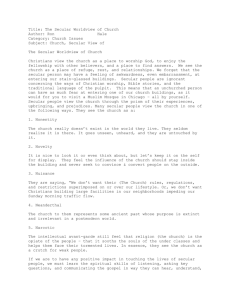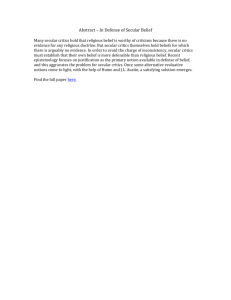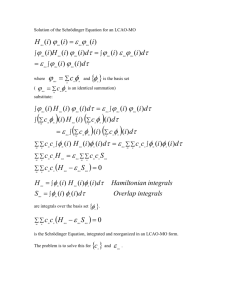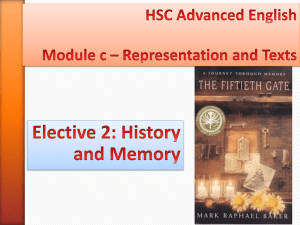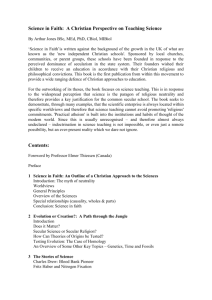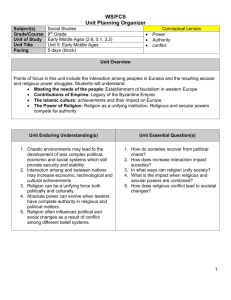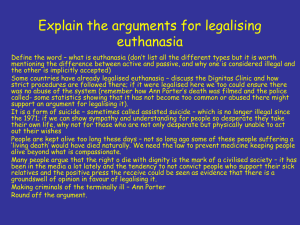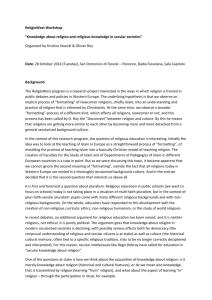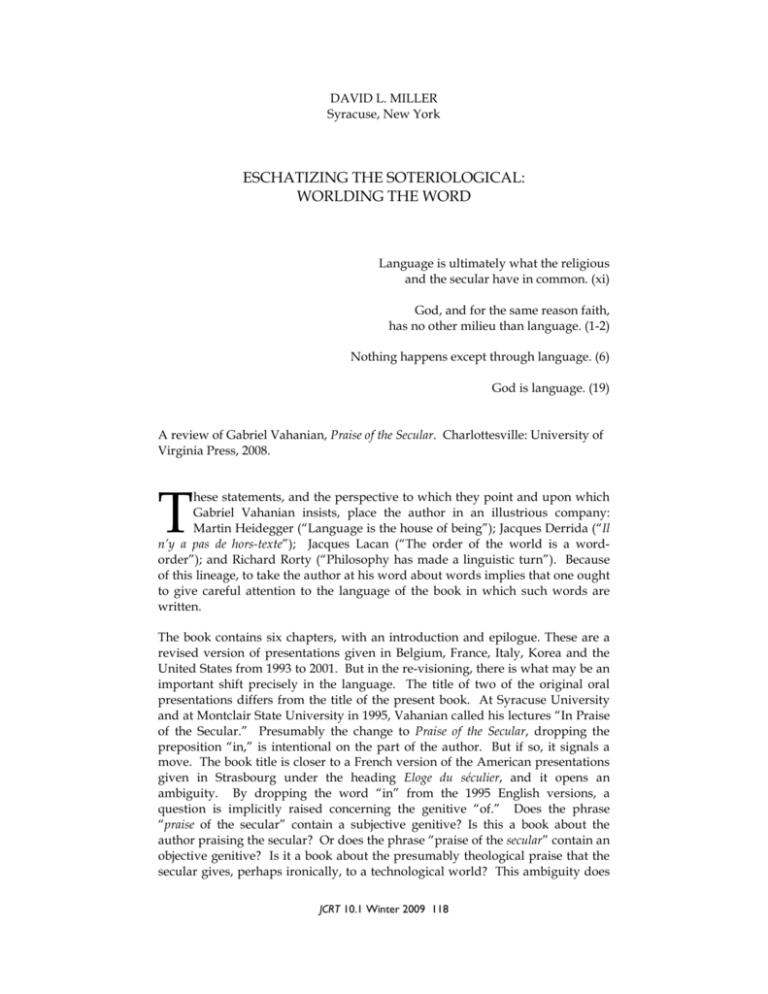
DAVID L. MILLER
Syracuse, New York
ESCHATIZING THE SOTERIOLOGICAL:
WORLDING THE WORD
Language is ultimately what the religious
and the secular have in common. (xi)
God, and for the same reason faith,
has no other milieu than language. (1-2)
Nothing happens except through language. (6)
God is language. (19)
A review of Gabriel Vahanian, Praise of the Secular. Charlottesville: University of
Virginia Press, 2008.
T
hese statements, and the perspective to which they point and upon which
Gabriel Vahanian insists, place the author in an illustrious company:
Martin Heidegger (“Language is the house of being”); Jacques Derrida (“Il
n’y a pas de hors-texte”); Jacques Lacan (“The order of the world is a wordorder”); and Richard Rorty (“Philosophy has made a linguistic turn”). Because
of this lineage, to take the author at his word about words implies that one ought
to give careful attention to the language of the book in which such words are
written.
The book contains six chapters, with an introduction and epilogue. These are a
revised version of presentations given in Belgium, France, Italy, Korea and the
United States from 1993 to 2001. But in the re-visioning, there is what may be an
important shift precisely in the language. The title of two of the original oral
presentations differs from the title of the present book. At Syracuse University
and at Montclair State University in 1995, Vahanian called his lectures “In Praise
of the Secular.” Presumably the change to Praise of the Secular, dropping the
preposition “in,” is intentional on the part of the author. But if so, it signals a
move. The book title is closer to a French version of the American presentations
given in Strasbourg under the heading Eloge du séculier, and it opens an
ambiguity. By dropping the word “in” from the 1995 English versions, a
question is implicitly raised concerning the genitive “of.” Does the phrase
“praise of the secular” contain a subjective genitive? Is this a book about the
author praising the secular? Or does the phrase “praise of the secular” contain an
objective genitive? Is it a book about the presumably theological praise that the
secular gives, perhaps ironically, to a technological world? This ambiguity does
JCRT 10.1 Winter 2009 118
Miller: Worlding the Word 119
not exist in the earlier title, “In Praise of the Secular.” In a way, the double
possibility of the present title is precisely the question that the book addresses
centrally. But this grammatical and rhetorical conundrum is not the only matter
indicated by linguistic attention.
Vahanian is an extraordinary stylist, which means that a good deal of the book’s
elegant argument is achieved in the twists and turns of the writing, in the grace
of the language. The book, which is truly an essai, is notably linked by italicized
paragraphs at the beginning and the end of each chapter. These paragraphs may
be read sequentially, and they function as segues for the thematic of the book’s
argument. Further, many of the individual sentences read like an aperçu, the sort
of insights-in-writing that one might expect from Heraclitus, Montaigne or
Pascal. Here are a few examples that will, I think, make the point that it is the
language that speaks in this book.
•
•
•
•
•
•
•
•
•
•
“A reinvigorating of the secular works against a fundamentalism, which
makes the relative absolute, and against an ideology of a kind of atheism
(“secularism”), which makes the absolute relative” (book jacket).
“Rather than eviscerating religion, the secular has played a major role in
prodding religion into overcoming itself. Instead of the religious
showing the way to the secular, the secular is now what is showing the
way to religion” (xi).
“We move from being to language as the prism through which yearns to
be grasped a self that would lack nothing if, verbum caro (like the word
become flesh), it only could lack itself” (xvii).
“We forget not only that from a biblical standpoint, such a God [a God
worshipped as an idol] is no God, but also, conversely, that no God is
God—not so much because God is beyond God as because no God is
beyond language” (2).
“No God is God that can be turned into an idol” (46).
“God has no etymology. God takes root in words, which have no roots”
(47).
“There is no greater simulator of itself than the self” (65).
“Faith consists in religion overcoming religion” (93).
“It takes God to debunk religion” (103).
“Words never have the last word” (109).
The insights gleaned from this sort of writing make the book a delight to read.
But the delight of the stylistic does not detract from the serious purpose, nor
from a theological argument radically aimed.
Vahanian has been leading the charge for nearly half a century on behalf of the
iconoclastic dimension of biblical faith, which means a charge against idolatrous
theologizing and the anthropologization of religious discourse and
understanding. At the same time, this has put him on the side of the secular,
especially in the context of a technological civilization, both of which — the
secular and technology — have often been mistaken for secularism. Vahanian’s
JCRT 10.1 (2009)
Miller: Worlding the Word 120
ground-breaking book on this topic, The Death of God, was published in 1961, and
it was followed by Wait Without Idols in 1964, No Other God in 1966, and God and
Utopia in 1977. In France he published L’Utopie chrétienne, La Foi, un fois pour
toutes, and Dieu anonym. Many articles accompanied these books, and, in my
judgment, one of these is extremely important for an understanding of
Vahanian’s program: namely, “Religion and Technology,” published in
Introduction to the Study of Religion, edited by T. William Hall (San Francisco:
Harper and Row, 1978).
In all of these, Vahanian refocuses the logic of theology, not on nature (as in
mythic or cosmological perspectives) and not on history (as in the soteriological
perspectives of Heilsgeschichte that were current when Vahanian emerged on the
theological scene), i.e., not upon the God of nature and cosmos and not on the
Jesus of history, but upon what he calls the eschatic or utopic. This refocusing
introduces centrally the figure of Spirit or Kingdom into theo-logic and, in my
view, overcomes a binitarianism that had, unwittingly and somewhat witlessly,
plagued Christian theology for centuries by centering on God or Jesus, and not
really being syntactically trinitarian. It perhaps goes without saying that
Vahanian’s trinitarian correction is not spiritualist in a heterodox manner of, say,
Joachim of Fiore or the so-called “New Age” and “third kingdom” movements.
It is, rather, iconoclastic, especially since it intends a re-valencing of the secular
against conventional understandings.
The current book continues this thematic but in an amplified and insistent form.
The thesis of the book is summed by the author late in the work. Here it is in the
book’s own words.
•
“Desacralization and secularization are the twin aspects of one and the
same process stemming from the biblical option for the primacy of
language over nature and history as receptacle of faith — a purely
nominal receptacle, given the thoroughgoing metaphoricity of language.
Speaking is believing” (95).
•
“Most emblematic of the eschatic dimension of faith and the tropological
use of language by which it is tested and attested is a triptych running
through the biblical tradition. It consists of three propositions: there is no
sacred enclosure in the Garden of Eden; there is no temple in the New
Jerusalem, either, so also is the tomb empty. Summed up in one, they
read: religion has no future except through the secular” (99).
•
“The issue? Call it secularization, a short-cut term whose connotations
have mostly been negative. But the process of which this term is
characteristic is no more a secret to the biblical tradition of hallowing
than creation or the incarnation is to its understanding of faith as
eschatic existence. In other words, ‘worlding the word’ is what biblically
lies at the root of what we, even derogatorily, call secularization. God
speaks and things happen” (127).
JCRT 10.1 (2009)
Miller: Worlding the Word 121
One can see how this makes sense. First, Vahanian focuses on the theological
axiom that only God is holy, i.e., that there is no God but God (Vahanian says:
“No God is God,” which means that God is no God!). In the biblical account of
creation “God speaks and things happen.” Further, creation is not only pronounced; it is also pronounced to be good. Vahanian refers to this as a
“worlding of the word.” This results in an affirmation of the secular, without
implying that the secular is divine. Similarly, the incarnation (“Word made
flesh”) announces the positive valence of history, body, flesh, which are also not
divine in themselves, even if they body forth the word of God. In such fashion
the secular is affirmed — not idolatrously, but iconoclastically — against the
tirades against secularism by fundamentalist theologisms, where the secular is
evil, and against the atheistic affirmation of anti-religious secularists, for whom
there is a potential idolatry of the secular as being “good” because it is all that
there is.
So if “the secular is the horizon of the incarnation and the word become flesh is
the worlding of the word in view of a utopic or eschatic (rather than merely
soteriological) understanding of the Kingdom of God” (3), then “the incarnation
consists, not in the enshrining of the word, but in its worlding, its secularization”
(42). This means that, “the secular rightfully belongs to the sphere of faith” (11).
Or, put forthrightly, “the idea of the secular as an inherent dimension of faith
could and should have been perceived as the cultural hallmark of the biblical
tradition” (xiv).
This has enormous perspectival consequences. For example, it implies that to
attempt to make peace among religions in a world of difference, diversity, and
global pluralism is wrong-headed on the face of it. It is clear from religious
violence and hatred that any attempt to fall back on a notion of the sacred as
common to religious traditions is bound to fail. Religions cannot work together.
They have nothing in common, especially nothing imagined under the aegis of
the notion of the sacred. Rather, as Vahanian puts it, “what we all have in
common is the secular” (30). It is here that the locus of transformation in the
world resides. But even more is implied by this, and radically so.
This focus on there being no other God but God also takes the emphasis off
soteriology, which would save the human from the secular, committing an
anthropoligization of religious discourse. Vahanian is clear about this. Here are
six examples of his insistence.
•
“Talk about God must remain unspoken, not only because it will turn
God into an idol, and not only because the experience of the holy is
ecstatic, but principally because language about the biblical God is
eschatic. Jesus comes, not so much to ‘save’ us as to proclaim the
kingdom of God, the antidote to our obsession with salvation” (viii).
•
“Religion, having long since turned into an obsession with salvation,
must finally come to grips with the mandates of its charter. It must
JCRT 10.1 (2009)
Miller: Worlding the Word 122
switch (back) to the recovery of the utopic streak of its grammar and
rhetoric (…) Jesus proclaims the kingdom rather than salvation” (7).
•
“ ‘What must I do to be saved’ gives way to ‘Who or what kind of God is
this God who saves me.’ This insight [from Luther] amounts to a virtual
shaking of the foundations of traditional religion (…) Faith lies in being
released from the very obsession with salvation” (34).
•
“The God of the Bible is a God who feels and contends for us. Instead,
we make God out to be a Savior, not to say a lifesaver. The God of grace
is God freely available; we make of God a God of ‘grace and favours,’
like those granted by the princes of this world. Failing to be able to save
the world, which God loves so much, we seek, instead of changing it, to
be saved from it” (44-45).
•
“Jesus is not obsessed with salvation; he is concerned with the Kingdom
of God, with the worlding of the word” (80).
•
“Call him [Jesus] Savior if we will, but the salvation he ushers in consists
rather in freeing us from our obsession with salvation” (62).
Not only have the people, when religious, been obsessed with salvation and with
being saved, but, as Vahanian argues, theological discourse has in the main been,
one might say, a salvation army, a militia whose logic has been basically
soteriological instead of being appropriately eschatological, i.e., iconoclastic with
regard to all notions of salvation. An “ ideology of salvation (…) still holds. (…)
It continues to control the texture of the good life and its ramifications into the
various goals of human existence, whether ultimate or penultimate, individual or
social, spiritual or temporal” (32). But it is suspect. It is suspect because “a God,
used as a crutch, is a God who, instead of dwelling in our flesh, obsesses us with
our salvation” (64). That is, it turns theology into sociology and, bluntly put, into
idolatry. “The soteriological overtones of the incarnation muffle the
eschatological design of its inner-most intention. (…) The eschatological is
shortchanged by the soteriological.” (79)
So, to return to the question of the ambiguous genitive in the book’s title with
which I began this review, it would seem that the answer is clear. Vahanian (this
reviewer imagines) changed the title so as to open the possibility of an objective
genitive. The book then does not remain simply a matter of an author praising
the secular against the fundamentalist and atheistic faux pas confusing secular
with secularism. It is, also, a matter of allowing the language of the secular and
the secularity of language to speak the worlded word. As Heidegger had said:
“Man does not speak; speech speaks.” I think of this move in and by Vahanian
to be, felicitously, an eschatizing of the soteriological, or an iconoclasm of
theology’s own self-idolatry. And, more than felicitous, in my view such a
perspective is needed even more today than in the death-of-god days of half a
century ago when Vahanian first gave birth to these insights that have now come
of age.
JCRT 10.1 (2009)
Miller: Worlding the Word 123
DAVID L. MILLER is Watson-Ledden Professor of Religion Emeritus at Syracuse
University and is a retired Core Faculty Member at Pacifica Graduate Institute in
Santa Barbara. Since 1963, Dr. Miller has worked at the intersections
of religions and mythologies, literature and literary theory, and depth
psychology and theology. He is the author of six books and more than
one hundred articles and book chapters. For more information, see the
website: http://web.syr.edu/~dlmiller/.
© David L. Miller. All rights reserved.
Miller, David L. “Eschatizing the Soteriological: Worlding the Word,” in Journal
for Cultural and Religious Theory vol. 10 no. 1 (Winter 2009): 118-123.
JCRT 10.1 (2009)


